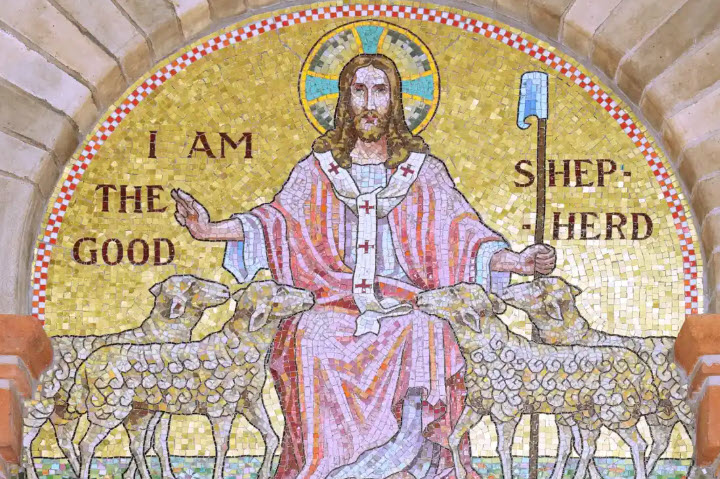
I have been spending a lot of time in recent days reflecting on the meaning of goodness, especially in the context of Mass readings to do with Jesus as “Good Shepherd” (Jn. 10).
One morning last week, Fr Malcolm asked me in the usual casual way, “How are you today?” and I wondered if I should answer, “Good, thank you” or “I am fine.” Either response would be “fine” wouldn’t it? The point I am getting at here is that the words “good” and “fine” mean pretty much the same in English, don’t they? Well, yes, in ordinary contexts, but not in special contexts. So, for example, “fine” art or “fine” wine are clearly different from “good” art or “good” wine.
This distinction is found in the Scriptures, as William Barclay tells us in his commentary on the Gospel of John, specifically in the Parable of the Good Shepherd. For there are two different words in Greek for our English word “good” and the difference is important theologically and spiritually. One is the term “agathos,” which captures something of the moral quality of a person. It takes in the virtues which form someone’s moral character. It is the word used in the reading from the Acts of the Apostles in today’s Mass (Tuesday – Acts 11:19-26) to describe St Barnabas. He is a “good man full of the Holy Spirit and faith.” His goodness is expressed in the way he encourages Paul to join him in Antioch to preach the gospel, especially to pagans living there.
But this is not the term used in John’s Gospel for the Shepherd! His goodness is of a different kind, though related to the moral version. Barclay tells us that the Greek term for this kind of goodness is “kalos.” This word can be translated in a number of ways such as beautiful, handsome, graceful, and fine. The word “callisthenics” derives from this term and refers to a kind of physical exercise that strengthens the body and develops its beauty.
So Jesus is no ordinary shepherd. His goodness is far greater than that of Barnabas. His goodness is exceptionally fine, as is the wine he makes out of water at Cana. Recall how the steward complained about the wedding party keeping the best wine ‘til last! Jesus is the finest shepherd imaginable insofar as he lays down his life for his sheep, seeks out the lost sheep, and wishes to give his followers life in abundance, life to the full. “Good” seems too weak a word to capture the meaning of God becoming part of his Creation and then dying to renew it.
I am struck by the link between “good” and “fine” in the sense of beautiful, which “kalos” suggests. Surely, the evangelist is not stressing the physical beauty of Jesus of Nazareth here, for nowhere in the Gospels do we get a description of the Lord. The beauty involved is the absolute perfection of the Holy Trinity, which overflows into Creation, and is reflected in an ultimate way in Jesus Christ.
It is put so “finely” in the words of St Catherine of Siena who prays to the Creator: “You have fallen in love with the beauty of your creature.” God is the fine artist, whose beautiful mind and heart is expressed in every movement of his brush, in the magnificent kaleidoscope of colour emanating from his creative Being.
Too often we reduce God’s holiness to the moral sphere, His loving goodness. But the use of this word ‘kalos’ for the Good Shepherd might inspire us to think also of the sublime beauty of God’s nature, which is beyond our imagination but is reflected in the beauty of Our Lord’s humanity and reflected in every created thing.
Mother Theresa of Calcutta summarised her mission of ministering to the poorest of the poor, often abandoned people on the streets as “doing something beautiful for God.” She too was ‘kalos,’ possessed by the Spirit of God, inspired to reveal to all the beauty of God “hidden under the distressing disguise of the poor.”
It is easy to answer the question, “How are you?” with the superficial sense of “I’m fine,” but the deeper answer remains when we can say of our heart, in the process of becoming more like the Good Shepherd, “Yes, I am fine, because God is doing beautiful things through me.”
Kieran Cronin OFM
